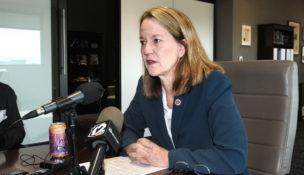Maricopa judge to decide fate of Arizona abortion laws amid legal challenge
Howard Fischer, Capitol Media Services//July 21, 2025//
Maricopa judge to decide fate of Arizona abortion laws amid legal challenge
Howard Fischer, Capitol Media Services//July 21, 2025//
Key Points:
-
Pro-abortion lawyers seek to dismiss abortion lawsuit challenge over delayed filings
-
Lawsuit is over Prop. 139’s constitutional right to abortion, limitation of state regulation
-
Lawsuits seek to eliminate 24-hour waiting period and in-person medical exams
Attorneys for doctors trying to void some existing abortion restrictions are working to keep a judge from hearing the lone arguments against their efforts.
A success on their part could leave no one to defend those laws, potentially allowing the judge to declare the statutes in question, such as a 24-hour waiting period, invalid and unenforceable.
What’s behind all this is a claim by lawyers for the Center for Reproductive Rights and the American Civil Liberties Union that House Speaker Steve Montenegro and Senate President Warren Petersen waited too long before filing their bid to dismiss the challenge, a move that would keep the laws in question on the books.
They told Maricopa County Superior Court Judge Greg Como that the two GOP lawmakers were both informed on May 22 that they had been granted extensions to file their paperwork, extensions that the plaintiffs’ lawyers said they agreed to “out of professional courtesy.” Yet even after all that, it still took them until July 7 to file their arguments about why the lawsuit should be dismissed.
Attorney Andrew Gould, representing the Republican leaders, does not dispute the timing of all this. But he said it falls under the category of “excusable neglect.”
Anyway, Gould told the judge he should deny the request by challengers to reject their pleadings because any delay does not impair their ability to pursue their case.
What makes this important is that Attorney General Kris Mayes, who would normally be the one to defend the existing laws, has refused to do so. She concluded that the challenged statutes are no longer enforceable after voters approved Proposition 139 in November, a measure which placed a constitutional right to abortion in the Arizona Constitution.
Montenegro and Petersen do have a legal right to defend the constitutionality of the law, particularly with Mayes stepping aside.
But there’s still the requirement to meet all the legal deadlines. And suppose Como concludes there is no legitimate reason for the failure to do so, or that the late filings are not excusable. In that case, it eliminates anyone from the pending litigation who will defend the challenged laws.
Those laws go beyond the 24-hour waiting period. They also extend to mandatory in-person medical exams and a prohibition of prescribing abortion pills using telemedicine.
It also would leave no one to defend existing statutes, which make it illegal for a doctor to perform an abortion knowing the procedure is sought based on the sex or race of the child. And the same would be true of a parallel law that imposes criminal penalties on doctors who terminate a pregnancy “knowing that the abortion is sought solely because of a genetic abnormality of the child.”
Central to the case is the breadth of Proposition 139.
Approved in November by a 3-2 margin, it spells out in the Arizona Constitution that there is a “fundamental right to abortion.”
In the case where a fetus is not yet viable, a stage generally considered to occur between 22 to 24 weeks, it bars the state from adopting or enforcing any law or regulation that denies or interferes with that right “unless justified by a compelling state interest that is achieved by the least restrictive means.” And it further defines that “compelling state interest” as one seeking to improve or maintain the health of the person seeking abortion, and does so in a way to “not infringe on that individual’s autonomous decision making.”
There is more latitude for state regulation of post-viability abortions. But it still provides a right to abortion when a medical professional determines it “is necessary to protect the life or physical or mental health of the pregnant individual.”
The first post-approval lawsuit successfully wiped out a 15-week limit on abortions. There was no opposition.
This litigation goes deeper into the dozens of laws already on the books that affect abortion, specifically targeting rules that two abortion providers and the Arizona Medical Association say run afoul of the new constitutional provision.
Gould, on behalf of Montenegro and Petersen, argues that the Legislature had legitimate reasons for approving all of the restrictions which predate Prop. 139 that the lawsuit seeks to wipe out.
It starts with the fact the ballot measure does give lawmakers more leeway to regulate post-viability abortions. Yet, he said, the lawsuit seeks a blanket ruling striking down existing laws and restrictions even in those cases. And that, Gould told Como, makes the bid to strike down entire laws legally flawed.
He also pointed to other provisions, like an in-person examination and ultrasound requirement, saying that the lawsuit seeks to prove that these are never consistent with maternal health and autonomy, the touchstones that allow state intervention.
“There can be no serious dispute that requiring ultrasonography is narrowly tailored to advance a compelling state interest in protecting a pregnant woman’s health,” Gould said.
But, for the moment, the question is whether Gould, on behalf of the two GOP leaders, will be able to make his case to Como.
Attorneys for the challengers stated that the lawmakers missed several deadlines to file a motion to dismiss the lawsuit.
“Yet they have not even cited a standard for, let alone demonstrated, excusable neglect to justify their belated filing,” they told Como. Nor were they swayed by an argument by the two lawmakers that they “erroneously omitted a request” to extend the deadline to file a response to the lawsuit.
“But carelessness does not equate with excusable neglect,” they wrote.
Gould, however, takes a more expansive view of what constitutes “excusable neglect.”
“It may encompass delays caused by inadvertence, mistake or carelessness, at least when the delay was not long. There is no bad faith. There is no prejudice to the opposing party, and the movant’s excuse has some merit,” he told the judge.
And Gould said his July 7 motion to dismiss, while not meeting the June 30 deadline, was just “a minimal delay that had no practical impact on this litigation,” especially given the federal holiday.
The next hearing in this case is scheduled for Aug. 1.














































